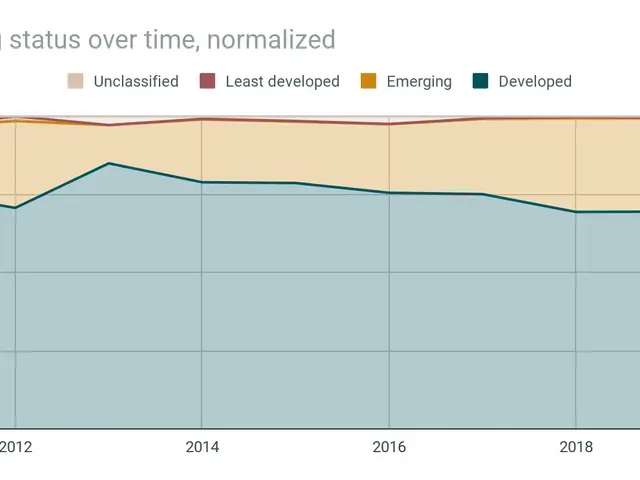Individual at age 58 successfully sells stocks to secure profits, facing impending hefty tax liabilities. Seeking advice for optimal next steps.
In the world of investments, understanding the intricacies of taxes can be a game-changer, especially for those approaching retirement. For a 58-year-old investor, navigating this landscape requires careful planning and strategic moves.
Aaron Brask, a financial advisor, suggests focusing on tax-efficient strategies. One such strategy is maximising tax-advantaged accounts, such as Individual Retirement Accounts (IRAs) and Roth IRAs. These accounts provide a tax shelter for investments, allowing them to grow tax-free until withdrawal.
Another strategy Brask proposes is harvesting tax losses. This involves selling off losing investments to offset capital gains elsewhere in the portfolio. This strategy is particularly effective when the market is down, as it can help minimise capital gains taxes.
Timing is also crucial when it comes to capital gains. Selling stocks more than a year and a day after purchase converts short-term capital gains into long-term capital gains, which are taxed at preferential rates. However, selling stocks could result in a substantial capital gains tax bill. Triggering this tax may be the right step in the near term to avoid the risk of being overexposed in retirement, especially when the market is down.
It's worth noting that reducing stock positions within an IRA or Roth IRA would not trigger any taxes. But selling off some stocks ahead of the typical September slump is not a bad idea for someone who is 58. This move could help minimise potential losses and reduce the taxable income for the year.
Investors, including the 58-year-old investor, may find themselves holding significant gains since January. These gains could lead to a hefty tax bill. It's strategic to defer gains into years with less taxable income rather than stacking them on top of high-income years.
The market has had a good year-to-date performance, despite a steep decline in April following President Donald Trump's tariff announcement. However, the market's volatility underscores the importance of tax-efficient strategies.
Brask also advises against letting taxes dictate the allocation of a portfolio. Peace of mind should trump the hassle of having to pay some taxes on gains. After all, the long-term capital gains rates are far below the 37% top ordinary income tax rate.
Lastly, it's worth mentioning that Roth IRA conversion may not be a good idea when taking gains in a portfolio, especially in a year with high gains. The self-employed might find deferring some income to 2026 a viable strategy.
In conclusion, for a 58-year-old investor, a tax-efficient strategy is key to navigating the complexities of retirement investments. By maximising tax-advantaged accounts, harvesting tax losses, and timing income and capital gains, investors can minimise their tax liabilities and secure their financial future.
Read also:
- Peptide YY (PYY): Exploring its Role in Appetite Suppression, Intestinal Health, and Cognitive Links
- Toddler Health: Rotavirus Signs, Origins, and Potential Complications
- Digestive issues and heart discomfort: Root causes and associated health conditions
- House Infernos: Deadly Hazards Surpassing the Flames







